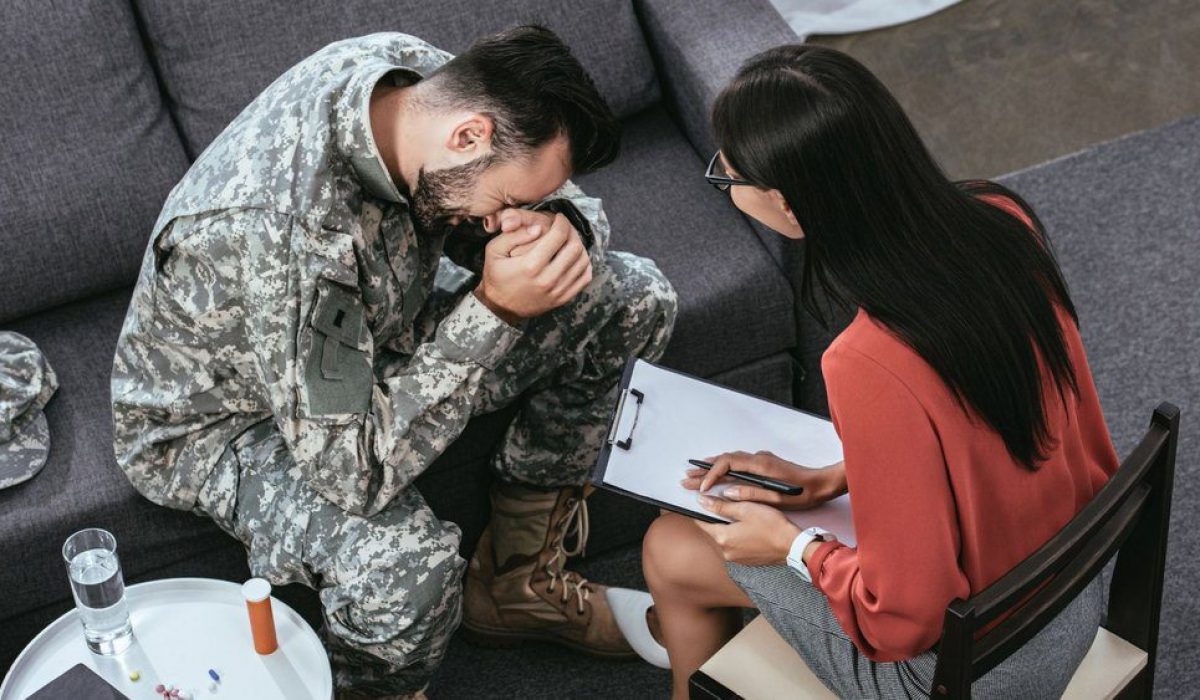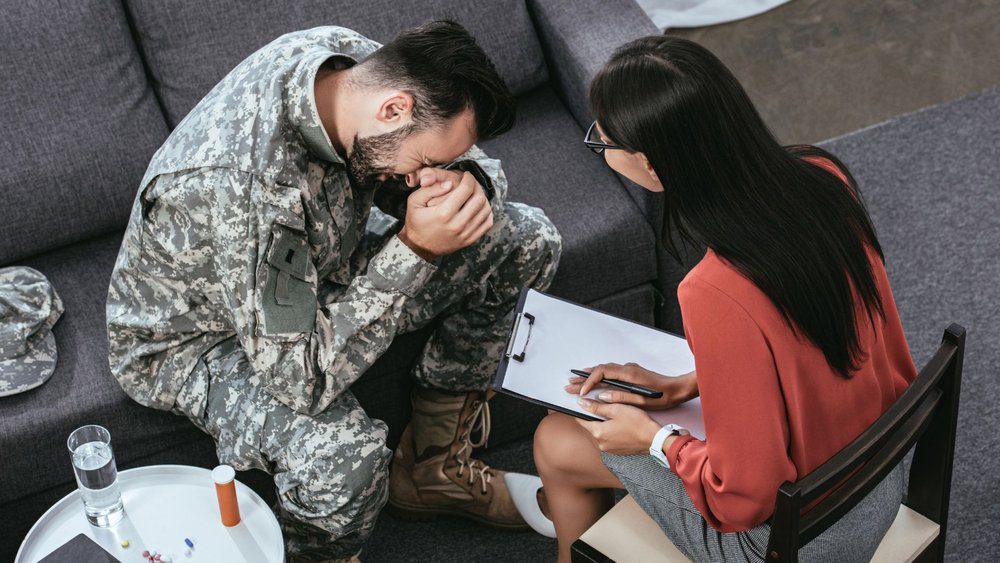Post-Traumatic Stress Disorder (PTSD) is a serious mental health condition that affects thousands of people every year. The most prominent group of individuals that experiences PTSD is veterans and active-duty service members. Several aspects of military service can result in traumatic experiences, which place current and previous service members at a much higher risk of developing PTSD compared to the general population. According to the American Forces Benefit Association, 6% of the general population are diagnosed with PTSD in their adult lives, but for military members, it is over 23%.
At Wake Counseling, we understand the challenges that come with military PTSD and are proud to assist those who have served our country. We provide compassionate, professional counseling for military PTSD and help service members, veterans, and their families begin the journey toward healing.
Our practice, located in Holly Springs, North Carolina, offers accessible and customized counseling for military PTSD. We are located near major military communities, including Fort Bragg, and are committed to helping service members and their families find peace, resilience, and recovery.
What is Considered PTSD in the Military?
PTSD in the military is defined as a psychological condition that develops after exposure to traumatic events, including active combat, life-threatening missions, military sexual trauma, or serious accidents. Unlike temporary stress reactions, PTSD symptoms are often persistent and interfere with daily life, relationships, and emotional stability. Some of the most common symptoms of military PTSD include:
- Flashbacks and intrusive memories
- Nightmares and difficulty sleeping
- Irritability, anger, or an inability to calm down
- Hypervigilance
- Avoidance of places, people, or situations that trigger memories
- Feelings of detachment, guilt, or hopelessness
Military culture can sometimes make it difficult for service members to reach out for help, but PTSD in veterans or active duty military members is not a sign of weakness. Seeking counseling for military PTSD is a natural response to extreme stress. Early intervention with a trained counselor or therapist for military PTSD can make a profound difference in recovery and long-term mental health.
What Can Trigger PTSD in Veterans?
PTSD triggers can vary, as each person has their own experiences and triggers. However, for veterans, common triggers may include:
- Loud noises, such as fireworks or gunfire, that are often similar to combat sounds
- Crowded or confined areas, often with a lot of people, that mirror battlefield environments
- News coverage of war or military operations that are currently ongoing
- Certain smells may bring back deployment experiences, such as:
- Fuel
- Smoke
- Chemicals
- Marital or relationship stress, as well as feelings of isolation after returning home
- Difficult adjust to civilian life after returning home
Even years after being in active duty status, veterans can experience powerful emotional and physical reactions to certain triggers, which can cause individuals to experience PTSD symptoms. At Wake Counseling, our counseling for military PTSD helps individuals identify and address these triggers, which is a key part of recovery.
Five Signs You Have PTSD from the Military
Commonly, there are 5 signs of military PTSD, and being able to recognize them early is important for addressing and conquering symptoms. Here are the five signs of military PTSD:
- Intrusive Thoughts – Often, those with military PTSD will relive traumatic events they have been through by experiencing flashbacks, nightmares, or recurring memories.
- Avoidance – When choosing to steer clear of people, places, or activities that are reminders of trauma, it is often a symptom of PTSD.
- Negative Mood Changes – Persistent feelings of shame, guilt, hopelessness, or detachment are serious signs of PTSD, as they are very detrimental to mental and physical health.
- Hypervigilance – Being easily startled, especially in crowded spaces, feeling “on edge” constantly, or having difficulty sleeping due to hyperawareness.
- Emotional Distress – Experiencing strong emotional and physical reactions to reminders of trauma. This is often accompanied by anxiety or depression.
Suppose you or a loved one is experiencing one or more of the 5 signs of military PTSD. In that case, it may be time to seek help from a licensed professional who is trained in trauma-focused therapy, such as our therapists for military PTSD.
Is It Hard to Prove PTSD to the VA?
There are two ways that the Department of Veterans Affairs may provide compensation for counseling for military PTSD.
PTSD Can Be Part Of Disability Rating
Depending upon various factors, veterans can claim disability for their PTSD symptoms. Depending on the length and severity of the symptoms, they will be rated as a percentage, which will determine the amount of compensation received every month. This benefit can help veterans pay for therapists for military PTSD when the VA won’t cover the cost through healthcare benefits.
VA Health Care Benefits For Military PTSD
When it comes to using veterans’ healthcare benefits to attend therapy through the VA, the process can be difficult and lengthy. Documentation of symptoms and a referral from a VA doctor are required if the VA is expected to compensate for the therapy. Essentially, the veteran’s PTSD symptoms must be connected to military service, and this may involve:
- Official service records or incident reports
- Medical evaluations and mental health assessments
- Statements from peers, family members, or colleagues
Local facilities in the VA Mid-Atlantic Health Care Network (VISN6) include:
- Asheville VAMC – 1100 Tunnel Road, Asheville, NC 28805 | (828) 298-7911
- Hampton VAMC – 100 Emancipation Drive, Hampton, VA 23692 | (757) 722-9961
- Beckley VAMC – 200 Veterans Avenue, Beckley, WV 25801 | (304) 255-2121
- Hunter Holmes McGuire VAMC – 1201 Broad Rock Boulevard, Richmond, VA 23249 | (804) 675-5000
- Durham VAMC – 508 Fulton Street, Durham, NC 27705 | (919) 286-0411
- Salem VAMC – 1970 Roanoke Boulevard, Salem, VA 24153 | (540) 982-2463
- VA Mid-Atlantic Health Care Network (VISN6) – 300 W. Morgan Street, Suite 700, Durham, NC 27701 | (919) 956-5541
The VA recognizes PTSD as a service-connected condition, and a veteran service officer at your local Veterans Services Office can help with the claims process, which can be lengthy and overwhelming. At Wake Counseling, while we do not handle PTSD VA claims directly, our therapists for military PTSD can provide mental health assessments and ongoing therapy sessions that may support your treatment journey and improve your quality of life while you work through VA benefits.
How Can I Help My Loved One with PTSD?
When a loved one is experiencing PTSD symptoms, it’s hard not to feel helpless. The best way to support a loved one who is experiencing PTSD is through patience, empathy, and education. Here are a few ways family and friends can help:
- Listen Without Judgment – Allow them to share experiences, but only when they are ready.
- Encourage Professional Support – Remind them that seeking support through therapy or local support groups is a sign of strength.
- Be Patient With Symptoms – It’s important to understand that irritability, avoidance, or isolation may stem from trauma. Seeking counseling can help you learn skills to redirect these emotions or support your own mental health.
- Maintain Routines – Creating and maintaining a consistent routine can help bring stability to daily life and cut down on exposure to triggers.
- Seek Support For Yourself – Family members can also benefit from counseling to help manage the challenges of caregiving or other aspects of living with a veteran or active military duty member with PTSD.
At Wake Counseling, we provide individual and family counseling alongside education to help loved ones build healthy communication and supportive strategies.
Can PTSD from the Military Be Treated?
PTSD from military service can be treated, and recovery is very possible through an evidence-based approach. At Wake Counseling, we offer a wide range of counseling services that are designed to meet the unique needs of veterans, active-duty members, and their families. Our goal is to help clients rebuild their lives, regain a sense of normalcy, and find new strength.
We combine specialized trauma work with other therapeutic techniques to address military PTSD holistically. These services include:
- Trauma & PTSD Counseling – Our therapists are trained to work with military-related trauma and the symptoms that present. We focus on helping clients process traumatic events, reduce symptom severity, and create healthier coping mechanisms.
- EMDR Therapy – Eye Movement Desensitization and Reprocessing (EMDR) is one of our core trauma-focused treatments, especially for past and present military members. EMDR helps individuals reprocess distressing memories, which can reduce the emotional charge of those memories over time.
- Anxiety Treatment – Since PTSD often also causes anxiety symptoms, such as panic, hypervigilance, and excessive worry, we provide anxiety-specific treatments that complement trauma counseling to reduce worry and restore calm.
- Depression Treatment – Many past and present service members with PTSD develop depressive symptoms, including low mood, loss of motivation, sleep disturbances, or hopelessness. Through our military PTSD counseling, we address depression directly, often in conjunction with trauma therapy.
- Online Therapy – For those in remote areas of North Carolina, with mobility constraints, or those who need flexible scheduling, Wake Counseling’s online therapy options offer access to care no matter where you are in North Carolina.
- Substance Abuse Counseling – Sometimes, individuals with PTSD may develop bad coping habits via substance use or dependency. Our substance abuse treatment in North Carolina helps to address those behaviors in safe, structured ways so healing can proceed without the interference of harmful coping mechanisms.
Can Insurance Cover Military PTSD?
Most insurance providers, including those that also coordinate with VA programs, do cover counseling for military PTSD. In North Carolina, veterans may be eligible for Care in the Community – Mental Health, a service offered through UnitedHealthcare, as they are a partner of the VA. Our team at Wake Counseling can help you better understand your specific insurance coverage and connect you with resources to make sure you receive the therapy care you deserve.
How Wake Counseling’s Therapist for Military PTSD Near You in NC Supports Military Families
From the moment you walk in the door or attend an online appointment, we personalize your care by carefully assessing your needs and matching you with the right therapist for military PTSD and other resources to help you overcome life’s challenges. Guided by integrity, respect, and generosity, we use holistic and evidence-based therapy approaches to empower you to achieve your goals and reach your full potential.


